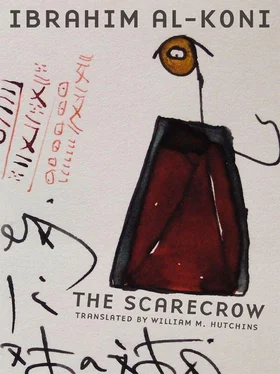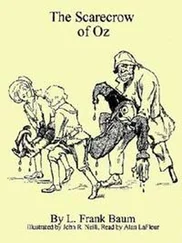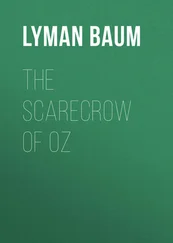The citizens did not understand the allusions of the venerable elder’s language, nor did they ever comprehend the ring of pain in his immortal moan. Similarly, on that day they did not understand his cryptic prophecy, which he released to the face of the oasis after returning from the realms of the Unknown: “I wish I had never seen you. I wish I had never known you and never known your world. I wish I had never lost my world. I wish I had never returned. I wish I had never been born. I wish I had never been born. I wish I had never been born.” Inquisitive minds asked him which birth he was referring to: “Today’s birth or yesterday’s?” His only reply was his time-honored, distressing groan, the secret meaning of which no one could ever decipher — neither in the generations living in the time of his first birth nor in the subsequent generations who were contemporaries of his second birth.
The nobles were the only ones who did not acknowledge any rebirth for the venerable elder.
The nobles described second birth as a superstition and qualified it with the adjective “purported,” to disparage the masses’ claims and to mock the exaggerations of people whose thirst for a prodigy was never quenched and who concocted one canard after the other.
The nobles said that the body’s transformation, the skin’s change, the growth of teeth or hair (or any other such phenomenon), which were characteristics they often found in desert trees and in species of camel, were no proof of a man’s rebirth — as the coteries of sorcerers had claimed. Because they frequented the venerable elder more than anyone else, and as time passed learned his secret better than anyone else, they were able to assert today, too, that the venerable elder had not returned from exile in the everlasting, had not migrated from the nook of forgetfulness, had not fallen back even one step into the world of human beings, and that his phrase — which many tongues repeated and in which simpletons detected a prophecy that expressed disgust at the horror of a return after an absence — was a phrase that might be heard from the mouth of a crazed person, the throat of a feverish man transported by a trance, or the breast of a poet overcome by yearning.
The elders said that the real treasure was the intellect and that they were the men who had repeatedly conversed with Emmamma and had attempted to find in him the purported rebirth that commoners discussed but had never harvested from his tongue any trace of a rebirth of his intellect. They were justified, therefore, in ignoring the masses’ claims just as they always ignored their rumors and other assertions, and had grown used to ignoring the venerable elder’s distressing moans over the past years, leaving him in the corner as an ornament and protective amulet for the council — as they always said.
When citizens inquired about the secret of the venerable elder’s recovery of his sense of sight (a sense that those who knew him personally asserted he had never lost), the elders responded to the question with a question: “If Emmamma has recovered his sense of sight thanks to the purported rebirth, why hasn’t he regained his sense of hearing too?”
5
“Today the council is entitled to convey glad tidings to a person who has always been an amulet for the council’s head,” Imaswan Wandarran bellowed into the venerable elder’s ear and then leaned back to sit erect. He snuck a glance at the man with two veils and then finally heard the response of the scion of eternity: “Oo … oo … oo … oo … ooh….”
He groaned for a long time and swayed right and left as he customarily did when a powerful sorrow overwhelmed him. Then he proceeded to release a moan of multiple pains, repeating it with the intoxication of the possessed till it slipped out of the council, circulated through the crannies, and descended to the realms. Then the Spirit World lodged it in the expanse of the homelands. The moan finally rose into the void — heartrendingly, feverishly, piercingly, like every ancient tune.
The moan departed, but its echo lingered in the air. Then the frail body lying in a heap on the rows of poles responded to the echo with a shudder like that of people dancing ecstatically.
Imaswan looked at all his colleagues in turn and then leaned toward his neighbor’s ear to elucidate the significance of the message: “Today the council can boast to the other tribes about the selection of our master to head the council. So may we hear from his mouth a thought about this puny gift?”
“Hey … ey … ey … ey … ey….”
Imaswan exchanged a look with the council members and then leaned back toward the scrawny body that time had consumed till it resembled a sheaf of straw. He thrust his mouth to Emmamma’s ear till his lips touched the venerable elder’s veil, from which desert suns had sucked the blue color till it faded, vanished, and turned a melancholy white.
He shouted in a repulsive voice: “Do I understand from this cry that our master endorses the council’s choice?”
“Ah … ah … ah … ah … ah … ah … ah … ah….”
The cry became a genuine song — like the opening of the grief-filled ballads that the tribes’ women poets call asahagh . Then the wasted body began to rock to the cry’s beat.
Imaswan watched him with despair. Then he retreated. From the precincts of the council a voice rose: “Our master is tiring himself.”
The peers looked up to find standing above them a dark giant whose black tunic’s sleeves revealed muscular arms on which lingered the murky glow that gleams on the skins of intensely black lizards. In this spectral giant the noblemen recognized the mamluk who bore the venerable elder’s stretcher and who always walked at the front while his shorter partner always walked at the rear. It was said that Emmamma had established this rule ages ago to keep his head raised high and thus allow him to watch the ebb and flow of creatures with his sharp, beady eyes, which the ghoul of time had vanquished — along with every other part of him.
In response to people’s questioning looks, the giant explained, “My master will never hear.”
Ah’llum taunted him with a sarcastic question: “Didn’t the rabble fill our ears with the legend of his rebirth?”
“My master hears when he wants to; he doesn’t hear when he doesn’t want to.”
“What are you saying, wretch?”
“My master hears what he wants to hear. He doesn’t hear what he does not want to hear!”
“Have you seen, wretch, any creature under the moon who doesn’t want to hear one day that the fates have smiled, finally, and seated him on the throne of leadership?”
“Actually, I know nothing of the nature of creatures, master, because I’m a slave who thinks with his hands not his head. But I can convey to my master the council’s offer, if the lords of the council agree.”
“What are you saying, wretch?”
“I’m saying that my master’s secret lies in his eyes not his ears.”
He put a hand in his breast pocket and drew out a highly polished stone tablet. He thrust his other hand into his tunic pocket and extracted a long piece of charcoal, as smooth as if it had been trimmed by a dagger’s blade. With this charcoal he drew letters of the ancient alphabet on the polished surface. Then he knelt facing his master and raised the tablet to his eyes.
The nobles watched this cunning strategist’s movement with curiosity. They observed the stillness that settled over the venerable elder for a moment but that did not last long, because his eyes suddenly narrowed, and his scrawny body responded with a tremor that did not continue any length of time, although the look from his wretched eyes afterward was not one the noblemen would ever be able to forget. Did it express astonishment, suffering, disdain, or genuine torment? Or, was it a mixture of all of these?
Читать дальше












